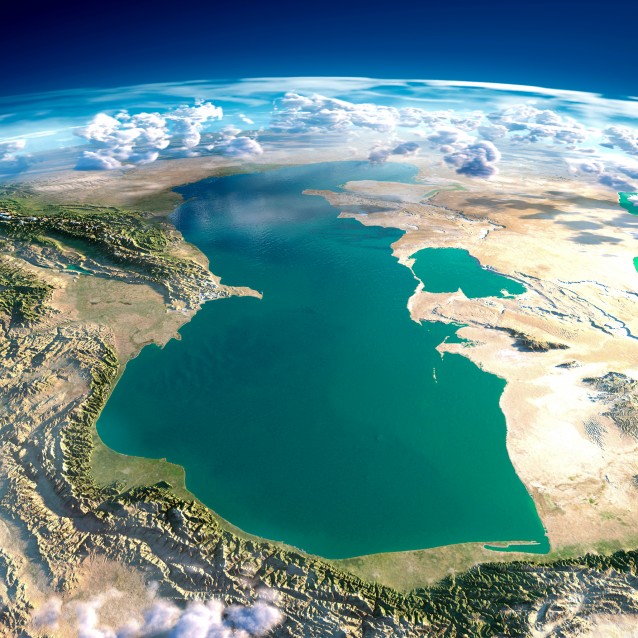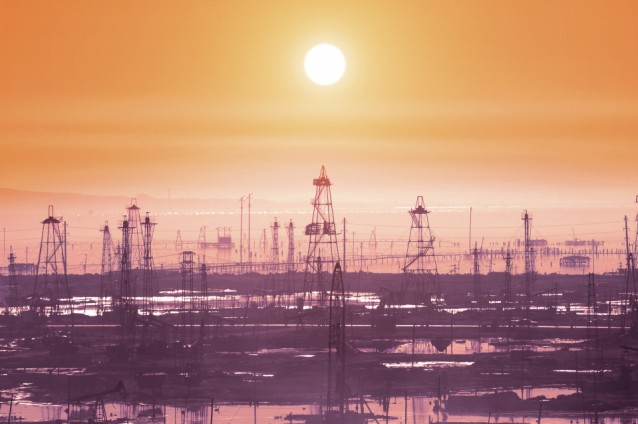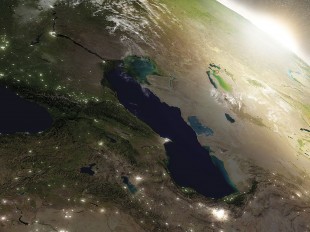On 12 August the leaders of the five littoral states of the Caspian Sea met at the 5th Caspian Summit in the Kazakh city of Aktau to settle the issue of how to divvy up the Caspian Sea. The result was the signing of what was quickly hailed as a landmark agreement – the Convention on the Legal Status of the Caspian Sea. Visions revisits the Caspian issue and examines what exactly this new agreement might have in store for Azerbaijan and the wider region.
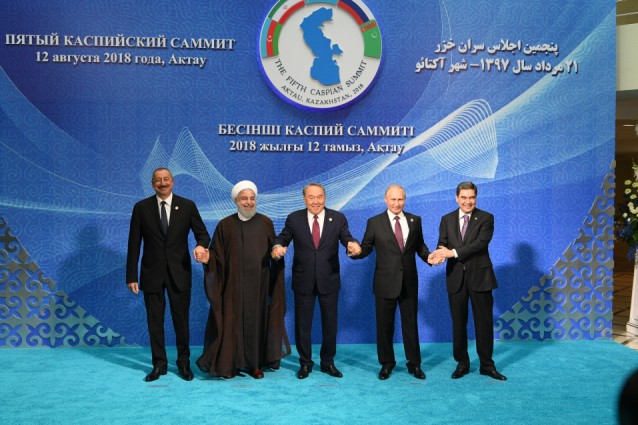 The five presidents gather for a group photo at the summit in Aktau on 12 August 2018. From left to right: Azerbaijani President Ilham Aliyev, Iranian President Hassan Rouhani, Kazakh President Nursultan Nazarbayev, Russian President Vladimir Putin and Turkmen President Gurbanguly Berdimuhamedov. Photo: Azertaj
The five presidents gather for a group photo at the summit in Aktau on 12 August 2018. From left to right: Azerbaijani President Ilham Aliyev, Iranian President Hassan Rouhani, Kazakh President Nursultan Nazarbayev, Russian President Vladimir Putin and Turkmen President Gurbanguly Berdimuhamedov. Photo: Azertaj
The thorny issue of how to the Caspian Sea first arose after the fall of the USSR and the creation of three new littoral states – Azerbaijan, Kazakhstan and Turkmenistan. Prior to this the Caspian Sea had been shared between Iran and the USSR and governed by two treaties: the Russo-Persian Treaty of Friendship (1921) and the Treaty of Trade and Navigation (1940).
But in the early 1990s the three new littoral states rightly pursued their own claims to the Caspian Sea, whose natural resources were estimated by the US Energy Agency as 48 billion barrels of oil and 292 trillion cubic feet of gas in proved and probable reserves as of 2013. The Caspian is also home to various species of sturgeon whose roe is sold internationally as the expensive delicacy caviar.
At the heart of the issue was whether the Caspian is really a lake or a sea, because determining its status would trigger different international law, affect the size of each state’s share and therefore the use of its vast energy and fishing resources. Under the Soviet agreements it had been treated as an inland lake, which if continued would mean splitting the Caspian equally between all the littoral states. If on the other hand the Caspian were deemed a sea it would fall under the UN Convention on the Law of the Sea and each state would receive a share proportionate to the length of its coastline.
Technically speaking the Caspian is neither – the fact it doesn’t connect to an ocean disqualifies it from being a sea while its vast proportions (in the region of 380,000 km2) and saltiness preclude it from being a lake. So its legal status could be argued either way based on what each party stood to gain, which is exactly what happened. Iran has the shortest coastline and therefore advocated the lake definition, which would give it a 20 per cent (as opposed to around 13 per cent) share of the overall seabed, whereas Azerbaijan, Kazakhstan and Turkmenistan favoured the sea solution and division using the median line method (based on length of coastline).
In the absence of an overarching agreement the Caspian was still being regulated by the Soviet-era treaties in conjunction with newer bilateral agreements, such as those between Azerbaijan, Russia and Kazakhstan agreeing to a division of the northern part. But the lack of clarity hampered regional cooperation, a good example being the long dispute between Azerbaijan and Turkmenistan over ownership of the Kapaz-Sardar oil and gas field that prevented it from being developed.
A working group was established in 1996 to resolve the issue but it took 22 years, involving dozens of meetings between experts and foreign ministers as well as four Caspian summits to reach the current consensus. In the end the Caspian is neither a lake nor a sea and instead has its own special status geared towards making the world’s largest inland body of water into an arena of peace and cooperation rather than potential military action.
A new constitution
Much of the groundwork to the new agreement was laid at the Fourth Caspian Summit on 29 September 2014 in the Russian port city of Astrakhan which built on previous summits in Baku (2010), Tehran (2007) and Ashgabat (2002). In Astrakhan a 19-point document was drafted establishing the main principles for a legal agreement which the parties aimed to sign at the following summit and several of these form the backbone of the new agreement.
Chief among them is the principle of governing the Caspian’s surface as a sea with each state’s sovereignty stretching over 15 nautical miles from its coast, plus an extra 10 for fishing rights. The rest of the water is to be for the common use of the five states. Effectively the surface is being treated as a lake and the seabed as a sea (see below).
Another key provision included in the new agreement is a prohibition on military bases and vessels belonging to non-littoral states in the Caspian, which has been seen as a diplomatic triumph for Russia and Iran, states long wary of US and NATO expansion east.
Use of the Caspian Sea for purely peaceful means is one of the key principles enshrined in the new convention. In accompanying agreements, the five littoral states vowed to increase cooperation in combatting terrorism, organised crime, drugs smuggling and poaching. The Convention is a kind of constitution of the Caspian Sea. It seeks to regulate the whole range of issues connected to the rights and obligations of the littoral countries, as well as becoming a guarantor of peace, stability and the blossoming of the region as a whole, Kazakh President Nursultan Nazabayev said at the signing ceremony.
His words also reflect the shared hope that the agreement will spur a new wave of economic development. In tune with this the five states agreed to establish a Caspian Economic Forum to facilitate business and entrepreneurship between them; the first one is scheduled to take place in Turkmenistan in 2019. Russian President Vladimir Putin pointed out the Caspian’s tourism potential, estimating, according to the news agency Ria Novosti, that with the right modern infrastructure resorts on the Caspian could attract up to a million people per year. Meanwhile Iranian President Hassan Rouhani advocated for greater energy cooperation between the five states, the overall message being that the Caspian Sea should be used for the collective (and exclusive) benefit of the littoral states.
Other articles in the convention deal with the right to conduct scientific research and the commitment to preserving the ecology of the Caspian Sea, whose populations of endemic species such as sturgeon and Caspian seals have declined in recent years with the growth of oil and gas exploration. Just weeks before the summit in Aktau, the five states signed a landmark agreement in Moscow called the Environment Impact Assessment Protocol under the Tehran Convention obliging them to assess the ecological impact of future projects.
The view from Azerbaijan
Increased cooperation over security, tourism and the environment will of course benefit Azerbaijan, but for Azerbaijan the Caspian Sea is above all a source of transport and energy opportunities. As Rasim Musabekov, a deputy in the Milli Mejlis wrote in the analytical magazine Region Plus: Being the oldest oil laboratory in the world and a pioneer of oil extraction at sea, Azerbaijan occupies a special place in the Caspian.
It is hoped that the new agreement will also help quicken Azerbaijan’s transformation into a transport hub. The country’s investment in the Caspian as a transport artery is something President Ilham Aliyev drew particular attention to in his speech following the signing ceremony:
The East-West corridor within which Azerbaijan provides transit services to Kazakhstan and Turkmenistan and the North-South corridor through which Azerbaijan transits cargoes between Iran and Russia are projects that strengthen economic cooperation, create new jobs, bring our countries even closer together and contribute to the strengthening of stability and security.
Another potential gain for Azerbaijan concerns the Trans-Caspian Pipeline, a project first mooted in the mid-late 1990s to deliver gas from Turkmenistan – which reportedly has the world’s fourth largest gas reserves – to Europe via Azerbaijan, which would increase Azerbaijan’s significance as a key player in ensuring European energy security. The new convention allows for underwater pipelines to be built with the consent of only the parties affected rather than of all five states as had previously been the case. Theoretically this gives the project the green light, although doubts remain over whether it could still be halted on ecological grounds. Russia and Iran, which have long opposed the project citing its environmental impact, may continue to do so to defend their own energy interests. And that hurdle aside, the high cost of delivering gas from Turkmenistan would still have to be negotiated.
Summarising the significance of the convention from the Azerbaijani side, head of the research centre Caspian Barrel, Ilham Shaban, told Visions via email: The important thing is that there is now a legal document, according to which, in the legal field, Azerbaijan, as well as the other Caspian littoral countries will act in the Caspian and develop their relations. Before this happened usually within the framework of bilateral policies, as a result of which parties determined joint actions in relation to fishing, as well as oil and gas deposits, if this were in the interests of both countries. And there were instances where common interests weren’t found and the parties for many years remained in a deadlock.
Azerbaijani commentators have also noted that any increase in Azerbaijan’s geopolitical significance at the expense of neighbouring Armenia is likely to boost Azerbaijani efforts towards a positive resolution of the long-running Karabakh conflict.
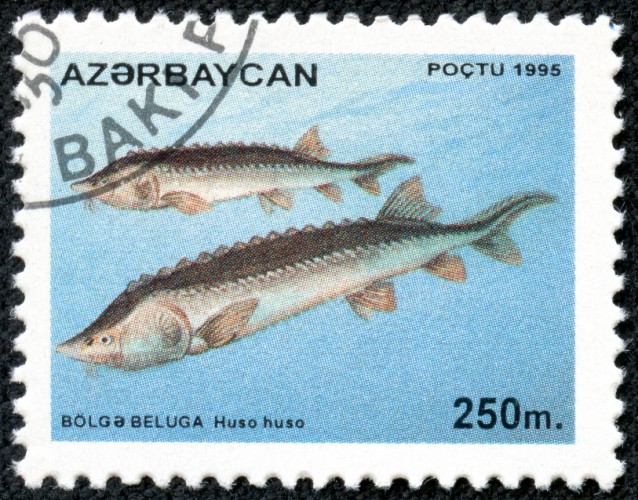 The Caspian Sea is also a valuable breeding ground for various types of sturgeon, which produce the international delicacy caviar. Pictured here is an Azerbaijani postage stamp from the 1990s. Photo: Yangchao/Shutterstock.com
The Caspian Sea is also a valuable breeding ground for various types of sturgeon, which produce the international delicacy caviar. Pictured here is an Azerbaijani postage stamp from the 1990s. Photo: Yangchao/Shutterstock.com
Not quite there
The convention is therefore widely being hailed by many as a giant leap forward, described as “historic,” “landmark” and even “game changing” – after all this is the first major agreement in 22 years and clear evidence of the five littoral countries’ ability to compromise. Yet there is also some need for caution, one reason being the uncertainty over whether pipelines could be vetoed on ecological grounds. But the more obvious reason is that agreement hasn’t yet been reached on how to divide the Caspian seabed with all its oil and gas resources. The new agreement simply says that this will be subject to further agreements between individual states based on international law.
This important point was emphasised especially in Iran following the summit where Iranian Foreign Minister Javad Zarif responded to concerns Iran had ceded rights and territory in the Caspian Sea by stressing that exact shares hadn’t yet been determined. President Hassan Rouhani also seemed to dodge the issue by instead focusing on the new agreement’s security achievements.
The seabed issue relates primarily to the southern portion of the Caspian, as division of the northern part has largely already been agreed between Azerbaijan, Kazakhstan and Russia. Commenting on the extent to which the issue might become an obstacle to future cooperation, Mr Shaban told Visions that he didn’t expect it to trigger an economic slowdown:
Take for example the disputed oil deposit between Azerbaijan and Turkmenistan, which is called in either country Kapaz/Sardar. Before the reserves of this deposit were estimated at 100 million tonnes, but now just 100 million barrels. Could these two brotherly countries change their relations over this? If we look at the political and economic relations between Azerbaijan and Turkmenistan over the last 10 years, they have been consistently growing, especially over the last three to four years. Turkmenistan is buying more and more products and services in Azerbaijan, and in turn Turkmen oil and oil products are coming to global markets via Azerbaijani infrastructure.
Mr Shaban noted that the same applies to competing claims between Azerbaijan and Iran to the Araz-Alov-Sharg oil field since 2001: Baku didn’t want to strain relations with Tehran and froze the project. But trade, political and cultural ties with Iran over the last few years have been growing. Iran also advocates for stability in the Caspian and wishes to cooperate with the State Oil Company of Azerbaijan, even signing a memorandum in relation to this with the Azerbaijani minister of energy, he wrote.
In any case delimitation of the Caspian seabed will likely be a central issue at the next summit which is slated to take place in Turkmenistan. In the meantime, the littoral states will hope that the Convention on the Legal Status of the Caspian Sea can transform 20 plus years of discord into prosperity and development.
